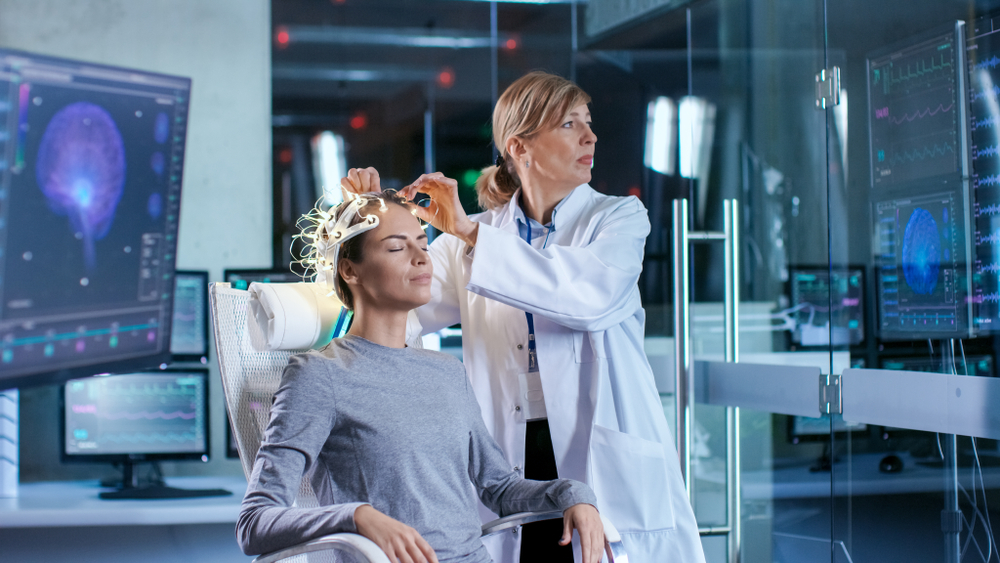How Neurocare Centers of America uses Neurofeedback
Neurofeedback to treat sleep disorders
Neurofeedback therapy is a safe and sustainable way to help individuals with sleep disorders, including insomnia and sleep difficulties. It promotes optimal brain regulation by encouraging or inhibiting specific brain activity in real-time. Electrodes are placed behind the ears and head to measure and record muscle movement and brain activity. This brain activity is then visualized on a screen through special software controlled by the clinician; the client then intuitively adapts brain activity based on the feedback they are seeing. A trained clinician also monitors progress and supports their client through a personalized program. Usually, clients attend 2 to 5 sessions per week and may notice improved attention and sleep in the first few weeks.
However, research and clinical experience show that 30 to 40 sessions are generally needed for these effects to be long-lasting. This therapy is proven by experience and research that it can improve behavior, attention, and sleep. In addition, it has shown a 76% response in people with ADHD; in many cases, individuals who have completed a Neurofeedback program no longer meet the criteria for diagnosing ADHD. This makes Neurofeedback an option for people who want a way to treat their symptoms without needing medications.
If someone has difficulty falling asleep or staying asleep throughout the night or waking up feeling exhausted or overtired during the day, that person may have a sleep disorder. Scientific research has demonstrated that when a person does not sleep well, it can negatively influence proper mood regulation and quality of attention.
Sleeping well is necessary for optimized health and can impact hormone levels, mood, and weight. Studies show that adults and children suffering from a mental illness are more likely to have an existing sleep problem. Our experience and research show that a person is more likely to be responsive to treatment if a sleep issue has also been targeted. An Actigraphy, a sleep evaluation, is always performed whether or not a patient reports a specific sleep problem. This information gives our therapist more details on the patient’s presenting symptoms, including sleep/wake behaviors.
There are several advantages to using Neurofeedback; It is a hundred percent free of medication side effects, it doesn’t involve surgery nor anesthesia or sedation, it doesn’t travel through the bloodstream like a medication, and it has minimal side effects. Neurofeedback also facilitates natural learning-through participation actively, and the individuals change their own brain behavior, not the Neurofeedback device. Long-term, sustainable outcomes can be achieved, unlike medications that lose their effect over time. Neurofeedback improves sleep quality and efficiency for improved health and well-being; improvements in brain activity are significant.


The subjacent causes of inattention, hyperactivity, impulsivity, or sleep disorders are not often the same in any two patients. That is why we create treatment plans based on the unique brain activity levels of the individual, whether a child, adolescent, or adult.
The efficacy of medication for sleep disorders will decrease with time. Neurofeedback is based on operant conditioning. Therefore, once regulation of the brain is learned, the effects are long-lasting. Research also demonstrates that attention, impulsiveness, and hyperactivity can further improve with time and the use of the training obtained during treatment. Many people see a sustained benefit after two years.
The success of Neurofeedback is noticeable. Research and clinical experience show that three out of four people improve significantly in symptoms of ADHD and sleep disorders when the treatment protocols are implemented by the staff at Neurocare Centers of Americas’ clinics.
As said before, Neurofeedback is not just for children and adolescents; adults can also respond positively. It is essential to know that Neurofeedback can’t be done at home; interested individuals must come to a Neurocare clinic to undergo all Neurofeedback therapies. The specialized technology utilized for treatment and the orientation offered by the highly trained Neurofeedback specialist is only available at our clinics.
It is important to know that you can take any prescribed medication as recommended by your physician during the treatment with Neurofeedback.
Neurofeedback is an Innovative Technology that delivers proven results, producing lasting changes in positive brain activity.
The clinical outcomes are clear. Positive shifts in brain activity levels can also be seen as evidence of the results of an entire course of Neurofeedback, demonstrated in QEEG outputs when patients have received a significant reduction in Beta spindles. High Beta spindle levels are characteristic of patients with sleep and impulse control problems.
